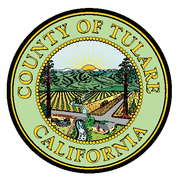
Health Caution Due to Wildfire Smoke
Fine particulate matter levels from wildfire smoke are high in Tulare County, making the air unhealthy for sensitive groups and other individuals alike. Smoke from wildfires is a mixture of gases and fine particles from burning trees and other plant materials.
“Community members should stay indoors and avoid exerting themselves,” warns Tulare County Public Health Officer, Dr. Karen Haught. “Even healthy people may begin experiencing unhealthy symptoms due to wildfire smoke.”
Wildfire smoke can irritate your eyes and respiratory system, cause coughing, chest pain, irritated sinuses and headaches, and trigger asthma attacks. Older adults and children are more likely to be affected by smoke and health threats from smoke. Seek medical attention if you experience worsening symptoms. Those with chronic heart and lung diseases are at increased risk of heart attack and stroke. Outdoor activities should be avoided. If you smell smoke, move inside to an air-conditioned environment.
Those who have heart disease should seek medical attention if they experience:
- Chest pain
- Rapid heartbeat
- Shortness of breath
People who have pre-existing respiratory conditions, such as respiratory allergies, asthma, and chronic obstructive pulmonary disease (COPD) should seek medical attention if they experience:
- Inability to breathe normally or wheezing and shortness of breath
- Worsening cough
- Chest discomfort
Limit your exposure to smoke by:
- Keep windows and doors closed, use your air conditioner if you have one and keep the fresh-air intake closed. If an air conditioning unit is unavailable, seek relief at one of the local cooling centers found at https://tchhsa.org/eng/index.cfm/public-health/public-health-emergency-preparedness-phep/.
- Use the recirculate option on your vehicle air conditioner.
- Avoid using gas stoves and vacuuming as these add to indoor pollution.
- Follow your doctor’s advice about medicines and your respiratory management plan.
- Ask your physician if it is safe for you to wear an “N95” mask. Properly worn, it may offer some protections and can be found at local hardware stores. Dust masks or paper comfort masks won’t provide protection for your lungs from smoke.
